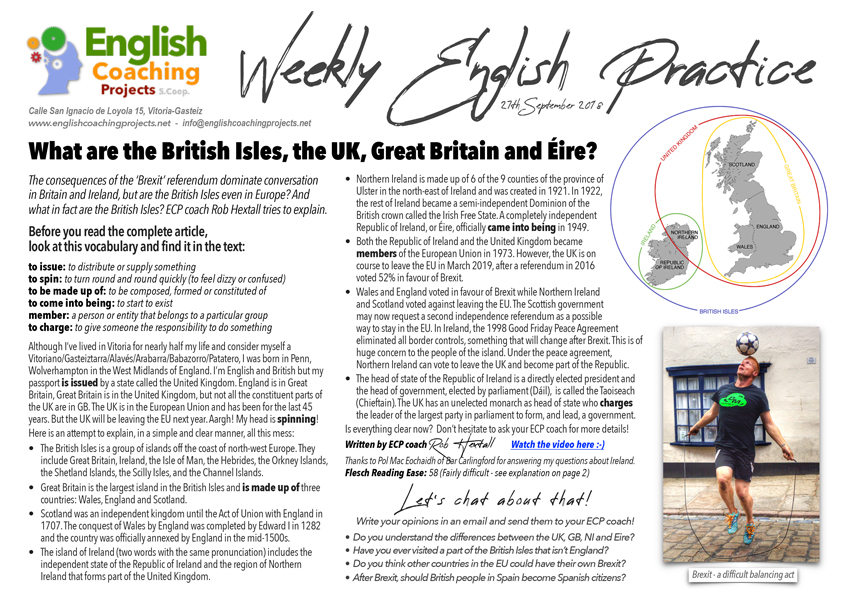With Brexit coming next year, ECP coach Rob tries to explain what the British Isles are. It’s not easy!
Click on the image to download the pdf
The consequences of the ‘Brexit’ referendum dominate conversation in Britain and Ireland, but are the British Isles even in Europe? And what in fact are the British Isles? ECP coach Rob Hextall tries to explain
Before you read the complete article, look at this vocabulary and find it in the text:
to issue: to distribute or supply something
to spin: to turn round and round quickly (to feel dizzy or confused)
to be made up of: to be composed, formed or constituted of
to come into being: to start to exist
member: a person or entity that belongs to a particular group
to charge: to give someone the responsibility to do something
Listen to the audio
Although I’ve lived in Vitoria for nearly half my life and consider myself a Vitoriano/Gasteiztarra/Alavés/Arabarra/Babazorro/Patatero, I was born in Penn, Wolverhampton in the West Midlands of England. I’m English and British but my passport is issued by a state called the United Kingdom. England is in Great Britain, Great Britain is in the United Kingdom, but not all the constituent parts of the UK are in GB. The UK is in the European Union and has been for the last 45 years. But the UK will be leaving the EU next year. Aargh! My head is spinning!
Here is an attempt to explain, in a simple and clear manner, all this mess:
- The British Isles is a group of islands off the coast of north-west Europe. They include Great Britain, Ireland, the Isle of Man, the Hebrides, the Orkney Islands, the Shetland Islands, the Scilly Isles, and the Channel Islands.
- Great Britain is the largest island in the British Isles and is made up of three countries: Wales, England and Scotland.
- Scotland was an independent kingdom until the Act of Union with England in 1707. The conquest of Wales by England was completed by Edward I in 1282 and the country was officially annexed by England in the mid-1500s.
- The island of Ireland (two words with the same pronunciation) includes the independent state of the Republic of Ireland and the region of Northern Ireland that forms part of the United Kingdom.
- Northern Ireland is made up of 6 of the 9 counties of the province of Ulster in the north-east of Ireland and was created in 1921. In 1922, the rest of Ireland became a semi-independent Dominion of the British crown called the Irish Free State. A completely independent Republic of Ireland, or Éire, officially came into being in 1949.
- Both the Republic of Ireland and the United Kingdom became members of the European Union in 1973. However, the UK is on course to leave the EU in March 2019, after a referendum in 2016 voted 52% in favour of Brexit.
- Wales and England voted in favour of Brexit while Northern Ireland and Scotland voted against leaving the EU. The Scottish government may now request a second independence referendum as a possible way to stay in the EU. In Ireland, the 1998 Good Friday Peace Agreement eliminated all border controls, something that will change after Brexit. This is of huge concern to the people of the island. Under the peace agreement, Northern Ireland can vote to leave the UK and become part of the Republic.
- The head of state of the Republic of Ireland is a directly elected president and the head of government, elected by parliament (Dáil), is called the Taoiseach (Chieftain). The UK has an unelected monarch as head of state who charges the leader of the largest party in parliament to form, and lead, a government.
Is everything clear now? Don’t hesitate to ask your ECP coach for more details!
Written by ECP coach Rob Hextall
Thanks to Pol Mac Eochaidh of Bar Carlingford for answering my questions about Ireland.
Let’s chat about that!
Write your opinions in an email and send them to your ECP coach!
- Do you understand the differences between the UK, GB, NI and Eire?
- Have you ever visited a part of the British Isles that isn’t England?
- Do you think other countries in the EU could have their own Brexit?
- After Brexit, should British people in Spain become Spanish citizens?


